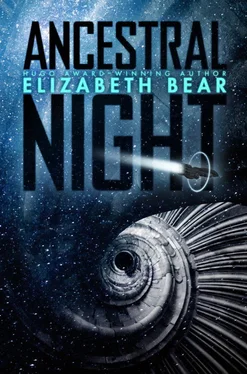The cobwebs of dark gravity were lovely, and it struck me how profoundly lucky I was to be able to sense them now. I was one of the first humans to perceive this, which—now that I was thinking more clearly—made me return to contemplate Singer’s comment on what a profound scientific tool I’d stumbled upon. That in itself might be enough to get us out of trouble with the Synarche, though it also probably meant that I would get drafted into public service along with Singer, leaving poor Connla on his own. The scientific and survey corps would be slavering to get their hands on this tech—to be able to sense dark gravity directly, rather than relying on gravitational lensing and its other effects on actual visible things, would be an observational advantage beyond profound.
Assuming, of course, that our scientists could find a way to duplicate it without murdering Ativahikas to get it. Maybe they could back-engineer the load I was carrying. Or isolate it and convince it to reproduce in volunteers.
I was in for a lot of blood draws, wasn’t I?
It amused me momentarily to think of those dark-matter laceworks of mass as actual cobwebs, structures spun for some purpose, then abandoned and left behind when that purpose was served and their denizens moved on. It was a conceit, of course: I didn’t imagine for an instant that some godlike creature or species had actually—literally or figuratively—pulled the universe out of its ass. But the image entertained me.
And while I was dwelling on it, I started to notice the anomalies.
They didn’t make sense to me, which I guess is the definition of anomaly . But picture a curtain that a kitten has climbed up, and the little pinprick holes and snags where the light shines through more brightly than it does elsewhere. That’s not exactly what I was sensing—there was no curtain, no light, and no kitten except for the one who was determinedly bumping my face with her head and meowing ( hello Mephistopheles, it’s not dinnertime yet, and I see cats enjoy helping with meditation almost as much as they enjoy helping with yoga)—but it gives the idea. The “pinpricks” didn’t form any immediately obvious pattern, and there was no immediately obvious cause for them to exist—and they didn’t line up with my mental map of transition scars, either, so it wasn’t that. They were minute—nanoscale—and they seemed evenly if not uniformly distributed.
I focused on committing the experience to my sensorium, because I wanted to spend some time examining it with Connla and especially with Singer. I managed to save the whole thing as a map we could study at our leisure—well, not quite the whole thing, because that would have been not merely an unparseable amount of data, but it would have filled up Singer’s whole brain with lots of extra left over.
Mephistopheles resorted to licking my ear. I don’t know if you’ve ever experienced a scratchy cat tongue inside your auditory canal, but let me tell you, it’s an unforgettable sensation.
The cat wasn’t going to let me focus anyway, so I opened my eyes and cuddled her. I talk to cats, like a lot of spacers. The cats don’t mind, and it keeps you from annoying your shipmates with constant chatter. And sometimes talking a thing through out loud with an appreciative audience is all you need.
(Okay, logically, I knew I wasn’t going to annoy Singer, because shipminds aren’t programmed to be annoyed by their crew, but my own internal controls kicked in and it stopped me from free-associating as well as I could when it came to the cats. Or cat, because talking to Bushyasta mostly involved saying “Sorry, kitty” when you pushed her snoring body out of the way.)
So I held Mephistopheles up to my face so her parti-colored nose nearly touched mine, and said, “Hey, cat, so you know what’s funny?”
She purred encouragingly.
“What’s funny is your face!” She squinched eyes at me, and I laughed. “All right. You’re a member of this crew, too. I don’t suppose you and your sister have a vote? I know, right? If only we had something to navigate by.”
And then I stopped, and stared into her furry little face. “Of course,” I said.
She purred.
“If only we did have something to navigate by.” I lobbed her underhand at her feeding station and turned my attention to Singer, readying the map to send to him. “I have something for you, ship.”
♦ ♦ ♦
After breakfast, while I was washing up, Singer pinged me and asked, “What do you think about pirates, Haimey?”
“Well,” I said. I thought about it, and about whether it was a trick question, but Singer generally wants to discuss things rather than playing gotcha games. It’s just that you only need one gaslighting relationship to train you to watch yourself. “I think the Admiral will get me if I’m not good, so I always wash behind my ears.”
Singer snorted.
“I think they’re antisocial.”
“But you don’t want to make a value judgment about antisocialness?”
“It’s not good for the rest of the community,” I said. “Obviously. It’s not good for the exploited if you—or pirates—are antisocial and exploit.”
“Everybody exploits, in some fashion.”
“Sure, but there’s… exploitation with consent and without it, I guess? Not all relationships are parasitic.”
“Yes,” he said. “Some are commensal. But I also consider this: as long as there have been exploited classes, the world has been looking for ways to keep those exploited classes from striving. Better to keep them from even feeling striving. Bleed them, starve them, terrorize them into learned helplessness, seduce them into Stockholm syndrome so they police themselves. Provide them with drugs—legal or illegal—and then use the sequelae of those addictions to control them further. Give them a minimum comfortable living so they’re not motivated to overthrow the government. There are ways, and some ways are more ethical than others. Rightminding is one of those tools.”
“You’re going to get fired by the Synarche before they even really hire you, if you keep this line of thinking up.”
He laughed his machine laugh. “This line of thinking is why they want me, Haimey.”
He was probably correct. “You sure nag me enough about my tuning for somebody who thinks rightminding is a tool of social oppression.”
“Control is not oppression, necessarily. And rightminding does help people be happier… . I think rightminding is a tool,” he answered. “And any tool can also be a weapon of oppression as easily as it can be an implement of construction.”
“Okay,” I said.
There was a pause, and I wasn’t sure if he was letting me think, or waiting to see if I would comment further. After a moment, he shifted gears.
“I also think I want to try analyzing how your alien parasite handles data, and whether it has anything we would recognize as being similar to an operating system.”
“You want to figure out how to hack it?”
“I don’t know,” he said, with a mellifluous sigh. “Can you hack alien technology? Does it even have written programs, algorithms, heuristics as we would identify them…?”
“Singer,” I said.
“I want to learn to hack it,” he owned.
♦ ♦ ♦
“Well,” said Connla, when I came out into the control cabin, “I was looking at your gravity maps, and I had an idea.”
“Let’s hear it.”
“It’s not a safe idea.”
“When are they ever?”
He chuckled. “Caution is your job. So, theorizing—the pirates want you for some reason.”
“Probably because they want to render me down for my parasites,” I groused.
Читать дальше












